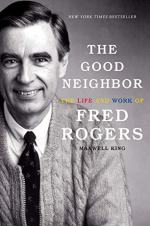|
This section contains 2,165 words (approx. 6 pages at 400 words per page) |

|
Acknowledging Individual Identity
A core component of Fred’s perspective and practice was his oft-stated assurance, offered to children and adults alike, that he liked them just the way they were – his acknowledgement and celebration of individual identity. This assurance, the book suggests, was offered unconditionally to everyone, regardless of age, racial or cultural identity, occupation, physical ability – in short, to anyone and everyone regardless of any aspect of themselves that might be considered “different.”
The narrative offers several examples of how this celebration manifested in Fred’s work on television. These include references to how African-Americans and other non-Caucasians, women, and individuals with disabilities or illnesses were integrated into the program’s narratives either as characters or as individuals with important stories to share. There are also references to how Fred ensured that there were representations of a range of experiences on his writing, production, and research staff...
|
This section contains 2,165 words (approx. 6 pages at 400 words per page) |

|




